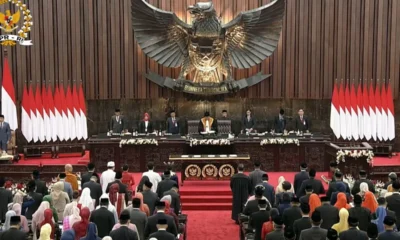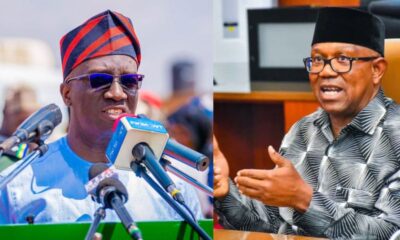Africa
Rethinking SAP: What Went Wrong and How Nigeria Can Move Forward -By Kassim Muhammad ibrahim
By focusing on currency management, economic diversification, social protection, transparency, and privatization reforms, Nigeria can amend its past mistakes and chart a path forward that promotes inclusive growth. With collaboration between government, international partners, and civil society, Nigeria can leverage the lessons of the past to build a more resilient and equitable economy for the future.

Nigeria’s economy faced significant challenges in the 1980s, including downturns, falling oil prices, and mounting debt. In response, the country implemented the Structural Adjustment Program (SAP), guided by the International Monetary Fund (IMF) and the World Bank. While SAP aimed to restore economic stability and growth, it also led to lasting social and economic impacts.
Thirty years on, Nigeria has a chance to reassess the Structural Adjustment Program’s impact and adapt its economic policies to current realities, paving the way for sustainable development and poverty reduction.”
Understanding SAP: Nigeria’s 1986 Economic Reform” The Structural Adjustment Program (SAP) was introduced by General Ibrahim Babangida’s military government in 1986 to address Nigeria’s severe economic crisis. Key components included:
The SAP’s Key Components
1. *Naira Devaluation*: Boosting exports and addressing trade imbalances
2. *Trade Liberalization*: Increasing foreign competition and reducing tariffs
3. *Deregulation and Privatization*: Privatizing state-owned enterprises to reduce government involvement
4. *Austerity Measures*: Reducing public spending on social sectors
5. *Subsidy Removal*: Phasing out subsidies on essential goods like fuel and agriculture
Kassim Muhammad Ibrahim (SRF-ICRED DBA)
Where Did Nigeria’s Economic Reforms Go Wrong?Despite its intention to reverse economic decline, the SAP’s implementation had several key flaws that may have exacerbated Nigeria’s economic challenges, offering valuable lessons for future reforms
1. Excessive Naira Devaluation
The Naira’s sharp devaluation, intended to boost exports, ultimately led to a significant decline in its value, triggering inflation and eroding purchasing power for ordinary Nigerians.
2. Over-Reliance on Oil
SAP policies failed to adequately address Nigeria’s oil dependence, leaving the economy vulnerable to global price shocks due to lack of diversification support.
3. Social Impact
Austerity measures and subsidy removals exacerbated inequalities, reducing access to essential services like education and healthcare for large segments of the population.
4. Weak Institutions
Poorly managed privatization led to monopolistic practices and weakened key sectors, rather than improving efficiency.
5. Lack of Accountability and Corruption
Widespread corruption during the SAP era undermined the economic reforms, with gains often being siphoned off, leading to public distrust..
Why Revisiting SAP Policies is Relevant Today
Nigeria’s economy still struggles with many of the same issues that the SAP was meant to address: over-reliance on oil, high inflation, unemployment, and a weak currency. While the global economy has evolved, Nigeria can benefit from revisiting the SAP policies to understand what can be corrected and adapted for today’s circumstances. Here are some areas that warrant re-examination:
1. Exchange Rate Management: Instead of the extreme devaluation policies of the 1980s, a more managed exchange rate system could be explored today to strike a balance between maintaining competitiveness and protecting the purchasing power of the population. Collaborative efforts between the Central Bank of Nigeria and global financial institutions could help craft a more sustainable currency management policy.
2. Economic Diversification: Unlike in the 1980s, when the SAP failed to diversify the economy, current policies could focus more on encouraging sectors like agriculture, manufacturing, and technology. Special attention could be given to industries that have shown growth potential, such as fintech, agro-processing, and renewable energy.
3. Social Protection Programs: Rather than cutting social spending as was done during the SAP era, the government today should invest in building a robust social safety net. Subsidies may be restructured to target the most vulnerable populations, ensuring that basic goods and services are affordable, while also prioritizing education, healthcare, and infrastructure.
4. Transparency and Accountability: SAP’s implementation was marred by corruption and a lack of transparency. Today, government reforms should ensure that economic policies are implemented with strong oversight mechanisms to reduce the likelihood of mismanagement. Digital tools and independent auditing bodies can ensure that the benefits of reforms reach the intended population.
5. Privatization Reforms: Nigeria can revisit the lessons of past privatization efforts and focus on strategic sectors where government involvement is still needed. Where privatization is necessary, there must be robust frameworks to ensure that public assets are fairly valued and that competition is promoted to prevent monopolies from forming.
Collaboration with Current Policies
Amending the SAP policies should not be a return to the same playbook of the 1980s. Instead, it must involve an integration of current global best practices, Nigeria’s unique economic landscape, and the country’s broader development goals. For instance:
• The African Continental Free Trade Area (AfCFTA) offers an opportunity to boost Nigeria’s manufacturing and export sectors. By aligning trade liberalization with regional cooperation, Nigeria could harness the benefits of a larger market while protecting its industries.
• Climate Action and Green Economy: Nigeria could integrate lessons from the past into the growing global movement towards a green economy. The transition to renewable energy and sustainable agricultural practices could become a cornerstone of Nigeria’s diversification agenda.
• Youth Engagement and Innovation: Current policies need to focus on equipping Nigeria’s burgeoning youth population with the skills and opportunities to participate in the modern, digital economy. Policies that support entrepreneurship, technology, and innovation will help to ensure that economic reforms create meaningful employment opportunities.
The Structural Adjustment Program of the 1980s undoubtedly played a crucial role in shaping Nigeria’s economic trajectory. However, many of its policies were either poorly implemented or failed to address the underlying structural challenges that continue to hold back Nigeria’s development today. Revisiting those policies, not with the intent of re-adopting them wholesale but rather to learn from their successes and mistakes, could offer valuable insights for Nigeria’s current economic challenges.
By focusing on currency management, economic diversification, social protection, transparency, and privatization reforms, Nigeria can amend its past mistakes and chart a path forward that promotes inclusive growth. With collaboration between government, international partners, and civil society, Nigeria can leverage the lessons of the past to build a more resilient and equitable economy for the future.
Ibrahim (SRF-ICRED DBA) a professional with a Doctor of Business, working in Strategy, Research, and Finance (SRF), International Centre for Research, Economic Development (ICRED). write in from Abuja




























